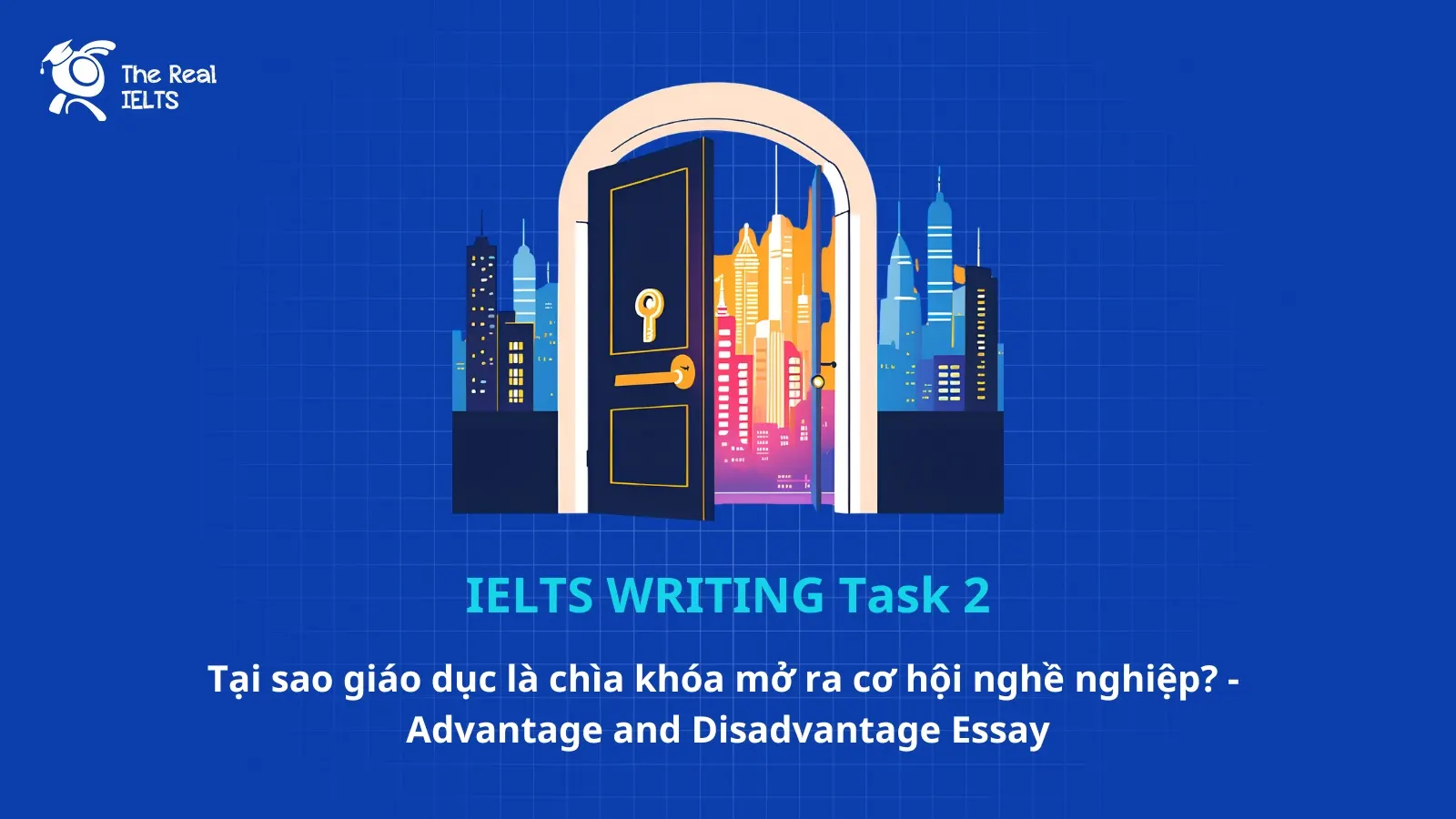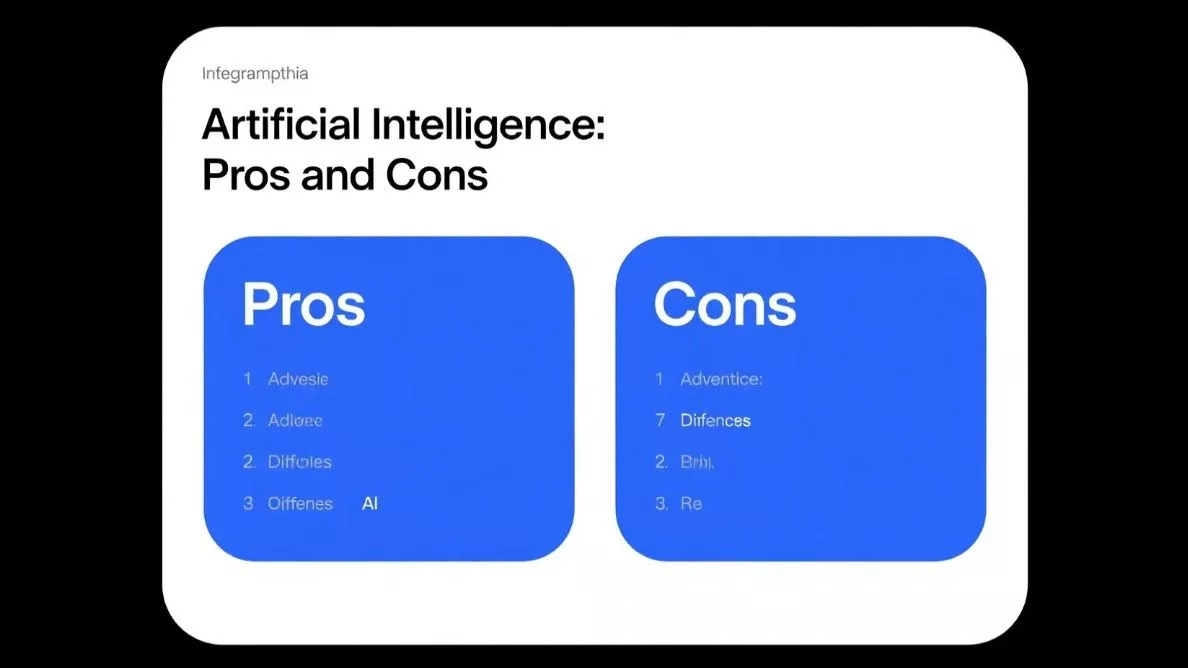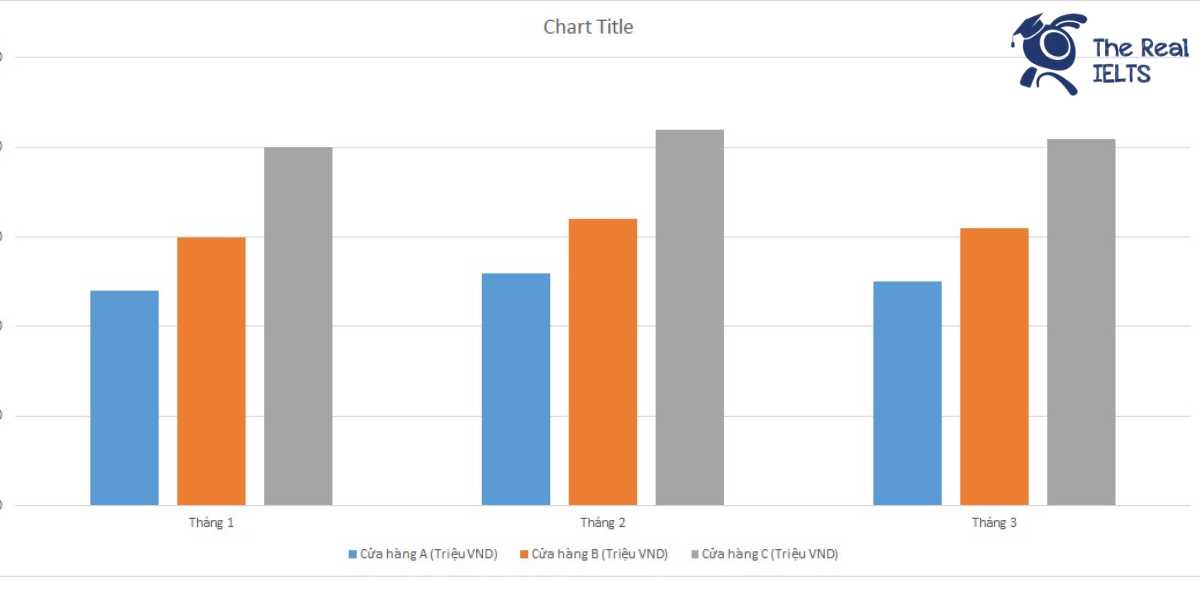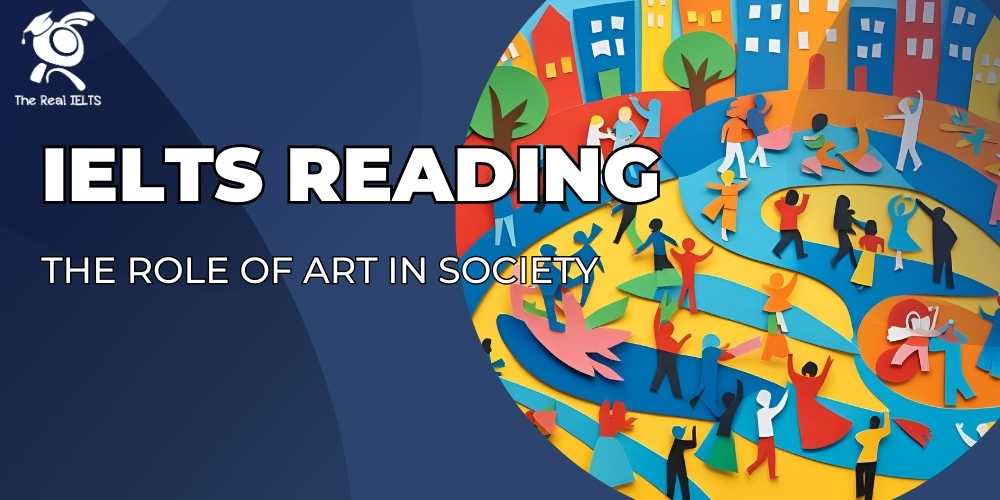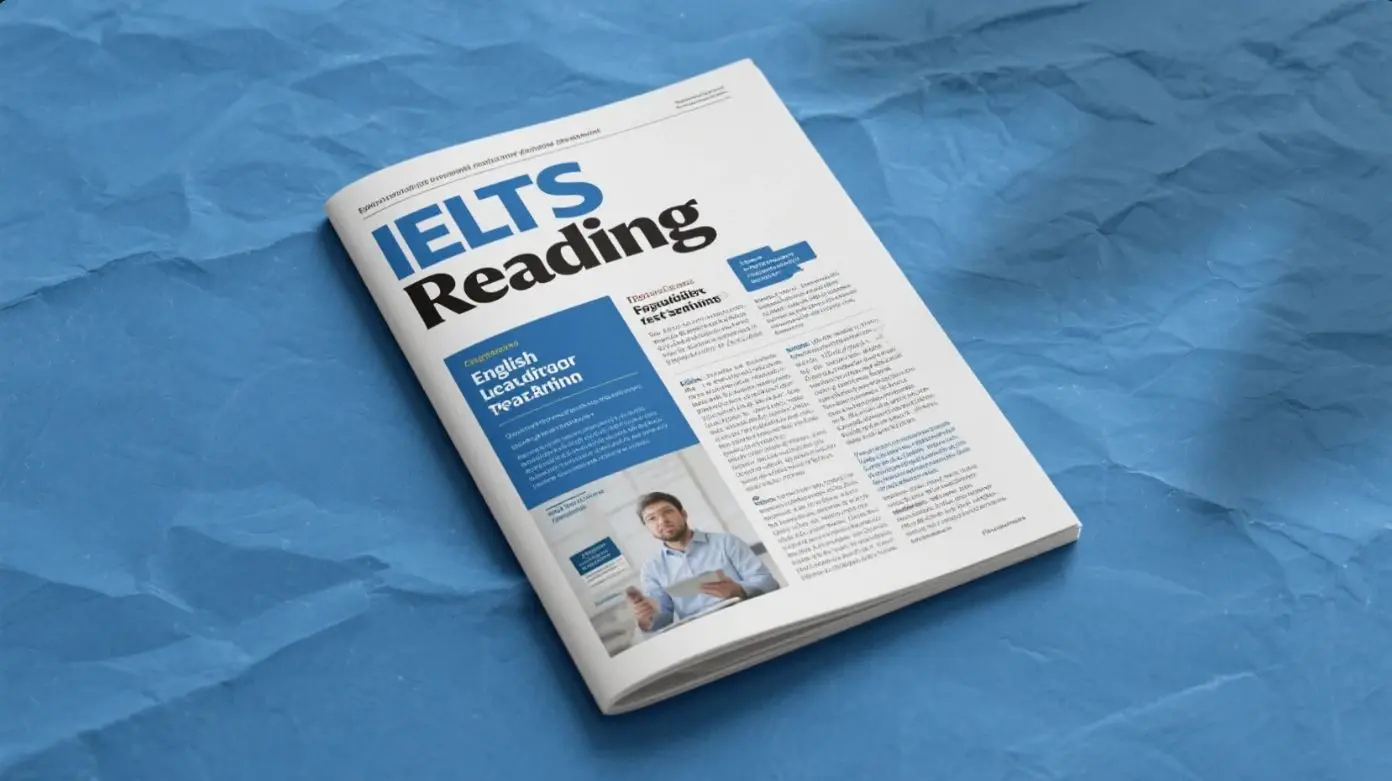Trong IELTS Writing Task 2, dạng Advantage and Disadvantage Essay yêu cầu thí sinh phân tích cả lợi ích và hạn chế của một vấn đề. Giáo dục được xem là chìa khóa mở ra cơ hội nghề nghiệp, nhưng liệu nó có nhược điểm nào không? Bài viết này sẽ làm rõ vấn đề.
Đọc thêm: IELTS Writing Task 2: Tại sao giáo dục là chìa khóa mở ra cơ hội nghề nghiệp? – Discussion Essay.
Đề bài IELTS Writing Task 2: Tại sao giáo dục là chìa khóa mở ra cơ hội nghề nghiệp? – Advantage and Disadvantage Essay
Many people believe that education plays a crucial role in career advancement. What are the advantages and disadvantages of relying on education for job opportunities?
Câu trả lời 1
Essay Structure:
- Introduction
- Paraphrase the statement
- Introduce the idea that relying on education for career advancement has both advantages and disadvantages
- Body Paragraph 1: Advantages of Education for Career Opportunities
- Provides specialized knowledge and skills
- Enhances employability and credibility
- Example: Higher education as a requirement for professions like medicine, law, and engineering
- Body Paragraph 2: Disadvantages of Relying Solely on Education
- Does not guarantee job opportunities
- Practical experience and skills are often more important in certain industries
- Example: Entrepreneurs and self-taught professionals achieving success without formal education
- Conclusion
- Summarize key points
- Suggest a balanced approach (education + practical skills)
Sample Essay:
Introduction
Many people believe that education is a fundamental factor in career advancement. While obtaining academic qualifications can improve job prospects, relying solely on education may also present certain drawbacks. This essay will explore both the benefits and limitations of depending on education for career opportunities.
Body Paragraph 1: Advantages of Education for Career Opportunities
One of the main benefits of education is that it provides individuals with specialized knowledge and essential skills required for professional fields. Many careers, such as medicine, law, and engineering, require formal education as a prerequisite to ensure competency and expertise. Additionally, possessing a degree or certification enhances employability and credibility, making candidates more competitive in the job market. Employers often prefer educated professionals, as they demonstrate discipline, critical thinking, and problem-solving abilities.
Body Paragraph 2: Disadvantages of Relying Solely on Education
Despite its advantages, education alone does not guarantee job success. Many industries prioritize practical experience, technical skills, and adaptability over academic qualifications. For example, successful entrepreneurs like Steve Jobs and Elon Musk built their careers through innovation and hands-on experience rather than relying on formal education. Moreover, some graduates struggle to find jobs because their theoretical knowledge does not always align with the demands of the workplace. This highlights the importance of combining education with real-world experience.
Conclusion
In conclusion, while education plays a crucial role in career advancement by providing essential knowledge and qualifications, it is not a guaranteed pathway to success. Practical experience, adaptability, and industry-specific skills are equally important. Therefore, a balanced approach that integrates both education and real-world experience is the most effective strategy for career growth.
Câu trả lời 2
Essay:
Education is often considered a key factor in career advancement, as it provides individuals with essential knowledge and qualifications to secure better job opportunities. However, relying solely on education for professional success has both advantages and disadvantages, which will be discussed in this essay.
One of the primary advantages of education is that it provides individuals with formal qualifications, which are often required for well-paying and prestigious jobs. Many professions, such as medicine, law, and engineering, require specialized training that can only be obtained through higher education. Additionally, academic institutions help students develop critical thinking, problem-solving, and research skills, which are highly valued in the workplace. Another benefit is that having a degree can improve job stability, as employers often view educated candidates as more competent and reliable.
Despite these benefits, relying solely on education for career success also has drawbacks. Firstly, formal education can be expensive and time-consuming, with no guarantee of employment after graduation. Many degree holders struggle to find suitable jobs due to the increasing competition in the job market. Secondly, education alone is often insufficient without practical experience and soft skills. Many employers prefer candidates with hands-on experience, adaptability, and interpersonal skills, which are not always taught in traditional academic settings. Furthermore, some industries, such as entrepreneurship and technology, prioritize creativity and innovation over formal qualifications, making practical experience more valuable than education in certain cases.
In conclusion, while education provides essential knowledge and credentials that can enhance career prospects, it should not be the sole factor in job success. A balanced approach that includes practical experience, adaptability, and continuous skill development is necessary for long-term career growth.
Câu trả lời 3
Many people rightly believe that education is crucial for career advancement. However, relying solely on education for job opportunities has both advantages and disadvantages.
Advantages:
- Foundation of Knowledge and Skills: Education provides a structured learning environment where individuals acquire fundamental knowledge and develop critical skills relevant to various professions. This foundation can be essential for understanding complex concepts, problem-solving, and adapting to new situations in the workplace.
- Credibility and Signaling: Educational qualifications, such as degrees and diplomas, serve as credible signals to employers, indicating a certain level of competence, commitment to learning, and ability to meet specific requirements. This can significantly improve the chances of getting shortlisted for a job.
- Access to Specialized Opportunities: Higher education often opens doors to specialized training, advanced studies, and career paths that require specific qualifications. For instance, fields like medicine, law, engineering, and academia typically necessitate advanced degrees.
- Networking and Connections: Educational institutions offer valuable opportunities for networking with peers, professors, and alumni. These connections can lead to mentorship, internships, and job prospects.
- Personal Development: Beyond career prospects, education contributes to personal growth by broadening horizons, fostering critical thinking, and enhancing communication skills. This can lead to greater self-awareness and a more fulfilling life overall.
- Higher Earning Potential: Statistically, individuals with higher levels of education tend to earn more over their lifetime. This is linked to access to higher-paying jobs and increased productivity due to advanced skills and knowledge.
Disadvantages:
- Cost and Accessibility: Quality education can be expensive and inaccessible to many, creating a barrier to opportunity and perpetuating social inequalities. Student loan debt can also be a significant burden.
- Theoretical vs. Practical Skills: Education sometimes focuses more on theory than practical application, leaving graduates unprepared for the real-world demands of a job. This gap between academic knowledge and practical skills can be a disadvantage in certain industries.
- Over-reliance on Credentials: Focusing solely on educational qualifications can lead to overlooking candidates with valuable skills and experience gained through alternative pathways, such as vocational training or apprenticeships.
- Job Market Mismatch: The skills and knowledge acquired through education may not always align with current job market demands. This can lead to unemployment or underemployment for graduates in certain fields.
- Rapidly Changing Job Landscape: In today’s rapidly evolving job market, skills can become outdated quickly. Relying solely on education obtained years earlier may not be sufficient for long-term career success without continuous learning and upskilling.
- Pressure and Competition: The pursuit of higher education can be stressful and competitive, potentially leading to burnout and mental health challenges.
In conclusion, while education offers significant advantages for career advancement, it’s important to acknowledge its limitations. A balanced approach that combines education with practical skills development, continuous learning, and networking is crucial for navigating the complexities of the modern job market and achieving long-term career success.
Câu trả lời 4
Introduction
Education has long been regarded as a key factor in career advancement, with many people believing that obtaining higher qualifications leads to better job opportunities. However, while education offers numerous advantages, it also has certain limitations when relied upon exclusively. This essay will explore both the benefits and drawbacks of depending on education for career success.
Advantages of Relying on Education for Job Opportunities
- Enhanced Knowledge and Expertise
One of the primary benefits of education is that it equips individuals with specialized knowledge and technical skills required for various professions. Careers in fields such as medicine, law, and engineering require formal training, which can only be obtained through higher education. - Better Job Prospects and Higher Salaries
Many employers prioritize candidates with formal qualifications, making education a key factor in securing well-paying jobs. Studies have shown that individuals with higher degrees tend to earn more than those without formal education. - Improved Career Stability and Growth
Education provides a sense of job security, as qualified professionals are less likely to face unemployment. Additionally, advanced degrees and certifications often lead to promotions and career advancements. - Networking Opportunities
Universities and educational institutions offer students the chance to connect with industry professionals, professors, and peers, which can open doors to career opportunities.
Disadvantages of Relying on Education for Job Opportunities
- Lack of Practical Experience
While education provides theoretical knowledge, it often lacks hands-on training. Many graduates struggle to apply their academic learning in real-world work environments, making experience equally important. - High Cost of Education
Pursuing higher education can be expensive, leading to student debt for many individuals. This financial burden can outweigh the benefits, especially if the degree does not guarantee immediate employment. - Changing Job Market Demands
In today’s rapidly evolving job market, certain skills become outdated quickly. Many industries, especially in technology and business, prioritize adaptability, innovation, and experience over academic credentials. - Limited Focus on Soft Skills
Education often emphasizes technical knowledge but does not always develop essential soft skills such as communication, leadership, and problem-solving—skills that employers highly value.
Conclusion
While education plays a vital role in career success by providing knowledge, qualifications, and job stability, it should not be solely relied upon. Practical experience, skill development, and adaptability are equally crucial in securing job opportunities. Therefore, a balanced approach that combines education with real-world experience is the most effective way to achieve career growth.
Câu trả lời 5
Introduction
Education is often considered a key factor in career advancement, as it provides individuals with knowledge, qualifications, and skills required in many professions. However, relying solely on education for job opportunities has both advantages and disadvantages. This essay will explore both sides of the argument.
Advantages of Relying on Education for Job Opportunities
- Better Employment Prospects:
- Many employers prioritize candidates with formal education, as it serves as proof of competence and commitment.
- A degree can open doors to specialized and high-paying careers in fields such as medicine, engineering, and law.
- Higher Earning Potential:
- Studies show that individuals with higher education tend to earn more over their lifetime compared to those without formal qualifications.
- Professional Development and Networking:
- Universities and colleges provide opportunities to connect with professionals, mentors, and peers, which can lead to career opportunities.
- Skill Development:
- Education helps individuals develop critical thinking, problem-solving, and communication skills, which are essential in any career.
Disadvantages of Relying on Education for Job Opportunities
- Lack of Practical Experience:
- Many graduates struggle to find jobs because they lack hands-on experience, which employers often seek.
- Some skills can only be learned through real-world practice rather than in a classroom.
- High Costs and Debt:
- Higher education can be expensive, leading to student debt that may take years to repay.
- Some graduates may struggle to find well-paying jobs despite their qualifications.
- Changing Job Market:
- In today’s fast-evolving job market, skills and adaptability are often more valuable than degrees.
- Many industries, such as technology and entrepreneurship, prioritize skills and experience over formal education.
- Unemployment Among Graduates:
- A degree does not guarantee a job, and some highly educated individuals remain unemployed or underemployed due to job market saturation.
Conclusion
While education provides valuable knowledge and career opportunities, relying solely on it can be risky due to the lack of practical experience, high costs, and changing job market demands. A balanced approach that combines education with hands-on experience, skill development, and adaptability is the most effective way to ensure long-term career success.
Câu trả lời 6
Education is widely considered a key factor in career advancement, as it provides individuals with knowledge, skills, and qualifications. However, relying solely on education for job opportunities has both benefits and drawbacks.
Advantages
- Better Job Prospects
Education enhances employability by equipping individuals with industry-specific knowledge. Many professions, such as medicine, law, and engineering, require formal education and certifications, making higher education essential for career entry and advancement. - Higher Earning Potential
Studies show that individuals with higher education degrees tend to earn more than those without formal qualifications. Employers often offer better salaries and benefits to candidates with specialized education, leading to financial stability. - Opportunities for Career Growth
A strong educational background opens doors for promotions and leadership roles. Many organizations require advanced degrees or professional certifications for managerial positions, making education a crucial factor in long-term career development.
Disadvantages
- Lack of Practical Experience
Many graduates struggle to secure jobs because they lack hands-on experience. Employers often prioritize practical skills and real-world problem-solving abilities, which education alone may not provide. - High Cost of Education
Higher education can be expensive, and many students graduate with significant debt. This financial burden may outweigh the benefits if job opportunities do not align with salary expectations. - Changing Job Market Demands
Some industries evolve rapidly, and formal education may not always keep up with technological advancements. Employers increasingly value skills, adaptability, and experience over traditional degrees, especially in fields like technology and entrepreneurship.
Conclusion
While education is an important pathway to career success, relying solely on it can be limiting. A balanced approach that includes both education and practical experience is ideal for securing job opportunities and achieving career growth.
Câu trả lời 7
Education is often viewed as a key factor in career progression, as it equips individuals with essential knowledge and qualifications. However, relying solely on education for job opportunities has both benefits and drawbacks. This essay will discuss the advantages and disadvantages of this approach.
On the one hand, education provides individuals with the necessary expertise and credentials to access better job opportunities. Many professions, such as medicine, engineering, and law, require formal education as a prerequisite. Holding a degree or certification not only enhances employability but also increases earning potential. Moreover, education fosters critical thinking, problem-solving abilities, and communication skills, which are highly valued in the modern workplace. Additionally, higher education institutions offer networking opportunities, enabling students to build professional connections that can be beneficial in their careers.
On the other hand, relying entirely on education for career advancement has some drawbacks. Firstly, formal education can be expensive and time-consuming, making it inaccessible to many individuals. Graduates often struggle with student debt, and there is no guarantee of securing a well-paying job after completing their studies. Secondly, many industries prioritize practical skills and experience over academic qualifications. For instance, entrepreneurs and professionals in technology and creative fields often achieve success through hands-on experience rather than formal education. Furthermore, the job market is constantly evolving, and traditional education may not always keep up with industry demands, requiring individuals to continuously update their skills through alternative learning methods.
In conclusion, while education offers significant advantages for career advancement, it is not without its limitations. A well-rounded approach that combines formal education with practical experience and lifelong learning is essential for long-term success in today’s competitive job market.
Câu trả lời 8
Education is often seen as a key factor in securing job opportunities and career advancement. It provides individuals with essential knowledge, skills, and qualifications required for professional success. However, relying solely on education has both advantages and disadvantages, which will be discussed in this essay.
Advantages of Relying on Education for Career Opportunities
One of the main benefits of education is that it equips individuals with specialized knowledge and technical skills. Many professions, such as medicine, law, and engineering, require formal education and certifications to ensure competency. Without the necessary academic training, individuals may not be eligible for such roles.
Additionally, education increases employability and earning potential. Many high-paying jobs require a university degree or specialized training, giving educated individuals a competitive edge in the job market. Employers often prefer candidates with academic qualifications, as it demonstrates discipline, problem-solving abilities, and a commitment to learning.
Another advantage is that education fosters critical thinking and adaptability. In a rapidly changing job market, those with a solid educational background are more likely to adapt to new technologies and industry trends, making them valuable assets to employers.
Disadvantages of Relying on Education for Career Opportunities
Despite its benefits, relying too much on education has certain drawbacks. First, formal education does not always guarantee employment. Many graduates struggle to find jobs in their fields due to high competition and a lack of practical experience. Some industries prioritize hands-on skills and work experience over academic credentials, making it difficult for degree holders to secure positions.
Furthermore, education can be expensive and time-consuming. Pursuing higher education often requires significant financial investment, and not everyone can afford tuition fees. Additionally, spending several years in academic institutions may delay entry into the workforce, while others who gain experience early may advance faster in their careers.
Lastly, some careers do not require formal education. Many successful entrepreneurs and skilled professionals have achieved success through self-learning, apprenticeships, and work experience. Fields such as technology, creative arts, and business often value innovation and practical skills more than academic qualifications.
Conclusion
In conclusion, while education provides valuable knowledge, skills, and job opportunities, it is not always a guaranteed path to career success. Practical experience, adaptability, and personal skills also play a crucial role in professional growth. Therefore, individuals should seek a balance between formal education and real-world experience to maximize their career potential.


